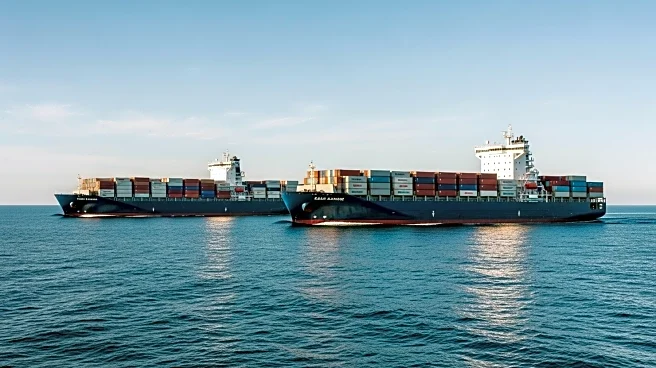What's Happening?
Germany's Ernst Russ has announced its first newbuild orders in years, partnering with Iceland's Eimskip to develop two innovative feeder containerships designed for the challenging conditions of the North Atlantic. The vessels, set to be delivered in the second half of 2028, will be 185 meters long with a capacity of 2,280 TEU, making them the largest in Eimskip's operation. The ships will be used on Eimskip's Blue Line sailing between Reykjavik, Rotterdam, and Teesport in the UK. The design incorporates advanced technology to enhance hydrodynamic performance, fuel efficiency, and operational reliability, featuring a dual-fuel propulsion system ready for methanol and LNG.
Why It's Important?
This development marks a significant milestone for Ernst Russ, representing its first newbuild investment in decades. The partnership with Eimskip not only strengthens the financial viability of the project but also supports Eimskip's ambitious plans to increase exports of fresh seafood and salmon. The new vessels are expected to future-proof Iceland-Europe trade routes, ensuring long-term revenue for both companies. The advanced design and technology incorporated into the ships highlight a commitment to sustainable and efficient maritime operations, which could set a precedent for future shipping projects in the region.
What's Next?
The delivery of these vessels is anticipated to enhance Eimskip's operational capabilities and expand its fleet, which currently consists of 14 vessels. Ernst Russ, managing a fleet of 26 vessels, will see its fleet grow to nine with the new additions. The companies have also negotiated options for two additional vessels, indicating potential further expansion. As the project progresses, stakeholders will likely focus on optimizing the ships' energy utilization and integrating sustainable practices into their operations, potentially influencing broader industry standards.
Beyond the Headlines
The collaboration between Ernst Russ and Eimskip reflects a strategic approach to addressing the unique challenges of North Atlantic shipping routes. The emphasis on dual-fuel propulsion systems and energy-efficient designs underscores a growing trend towards environmentally conscious maritime solutions. This initiative could inspire similar projects, promoting innovation and sustainability in the shipping industry, particularly in regions with demanding environmental conditions.









